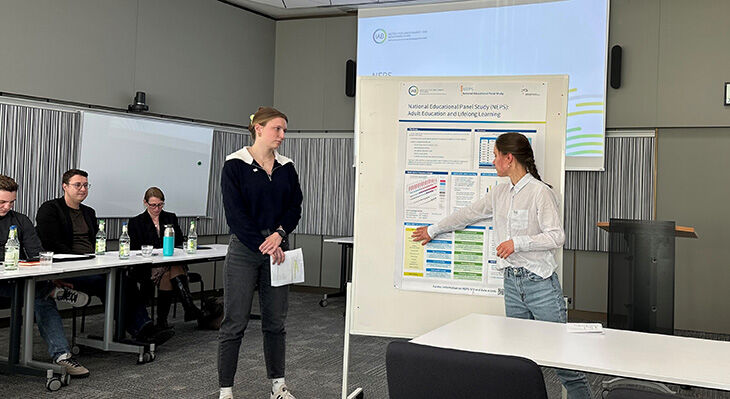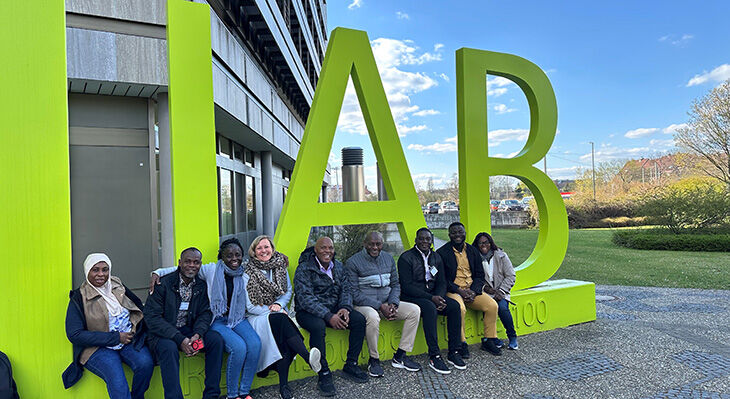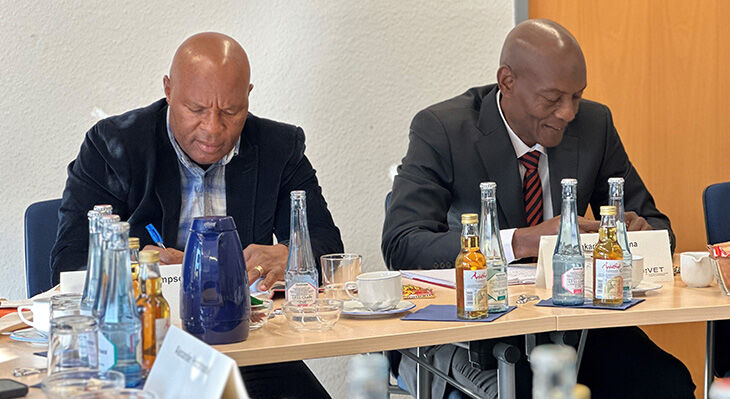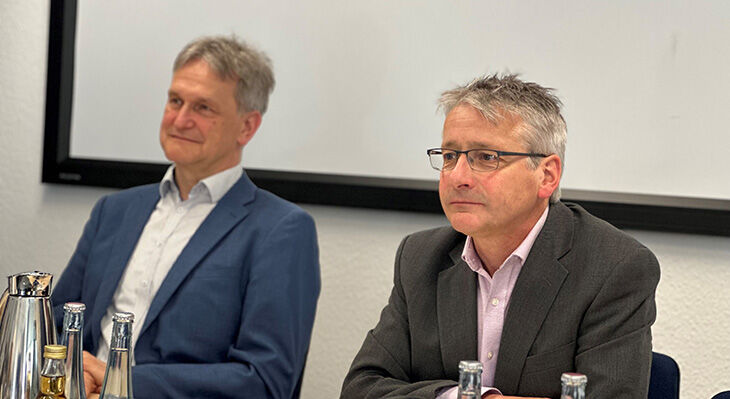Data as key to TVET: Delegation from Ghana visiting GOVET and BIBB
How well does a VET system work? Data and their analysis provide the answers. The topic of data reporting was the focus of a visit by a delegation from Ghana. In April 2025, GOVET received a high-level delegation for a one-week exchange.
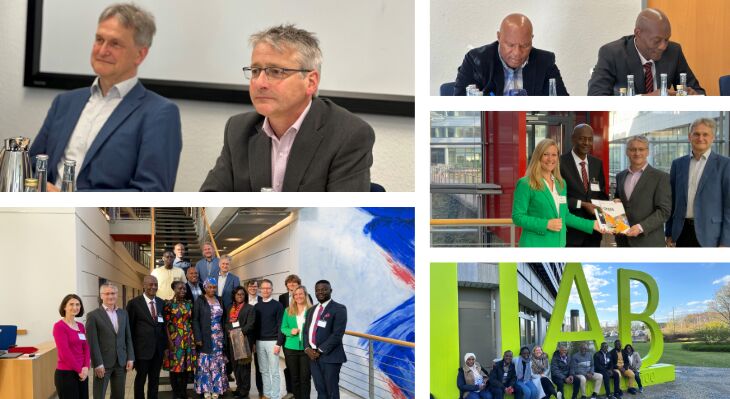
Data is the basis for informed decisions in VET policy. How can developments in the labour market be better predicted? What measures help young people to find the right occupation?
These questions were the focus of the visit by a high-level delegation from Ghana to the German Office for International Cooperation in Vocational Education and Training at the Federal Institute for Vocational Education and Training (GOVET) in April 2025. The group was led by Zakaria Sulemana, Director General of the Ghanaian Commission for Technical and Vocational Education and Training (CTVET), and comprised representatives of the Ministry of Education (MoE) and CTVET.
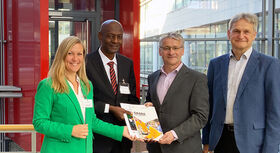
During the one-week study visit, approaches to TVET reporting and the use of education and labour market data were discussed. GOVET has been working closely with CTVET on behalf of the German Federal Ministry of Education and Research (BMBF) since 2019. Direct institutional cooperation between the Federal Institute for Vocational Education and Training (BIBB) and CTVET has existed since 2023. This cooperation aims to intensify institutional exchange and implement joint projects to further develop VET in Ghana.
The study visit to Germany offers a valuable opportunity to gain insights into best practices in data reporting within the vocational education and training sector. The exchange with GOVET and other German partners provides important inspiration for advancing TVET reporting in Ghana. We aim to learn from Germany’s experience to strengthen our own system and deepen the cooperation between our countries.
Zakaria Sulemana, General Director Commission for TVET Ghana
Insights into German TVET Reporting
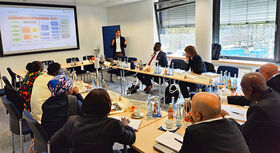
At the start of the delegation trip, Alexander Hochradel from the Federal Ministry of Education and Research (BMBF), Prof. Dr. Hubert Ertl, Head of Research at the Federal Institute for Vocational Education and Training (BIBB), Birgit Thomann, Head of the International Department at BIBB, and Ralf Hermann and Julia Olesen from GOVET welcomed the guests at BIBB in Bonn. Expert lectures provided a comprehensive overview of the German VET reporting system, data reporting and labour market forecasting models. The QuBe project (qualifications and occupations in the future), presented by Tobias Maier, was met with particular interest. The QuBe project allows future labour market needs in individual sectors to be compared with the expected numbers of skilled workers. This provides the responsible bodies with comprehensive options for planning and control.
Robyn Schmidt explained the processes of data collection, validation and analysis and showed how these findings can be used for political decision-making. Of particular interest were the clearly established processes between the various institutions, which increase the reliability of data.
Exchange with German institutions
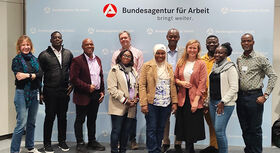
One of the trip's highlights was a visit to the Federal Employment Agency (BA) in Nuremberg. There, the participants discussed how data on vocational training is collected and evaluated. Michael Schumacher also presented the BA's wide range of measures for integrating young people into the training and labour market. This was followed by an exchange with the Institute for Labour Market and Career Research (IAB), which deals with the challenges and developments in vocational training research.
There was also time for science: at the University of Bamberg, the participants talked to experts from the Chair of Business Education about the various research projects. Dr Christian Schadt and Dr Awais Malik provided insights into qualitative and European comparative research on educational pathways.
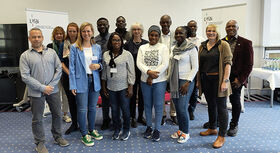
The programme was complemented by a contribution from the Leibniz Institute for Educational Trajectories (LIfBi), which provides key insights for educational research with the National Educational Panel Study (NEPS).
Prof. Dr. Cordula Artelt, Director of the LIfBi, and Dr. Michaela Sixt, Head of the NEPS Development Staff Unit, explained how the NEPS has been systematically investigating the educational pathways of seven different birth cohorts since 2009. Dr. Daniel Fuß and Dr. Lydia Kleine then presented the NEPS Research Data Centre and showed how the data collected can also be used by external researchers and incorporated into scientific analyses.
In addition to the institutional visits, the focus was on practice-oriented workshops in order to work directly together on solutions and to gain valuable impetus for future developments. One highlight was the ‘Brown-Bag-Seminar’, in which the Ghanaian delegation presented their current work and challenges in the field of TVET reporting. In addition, an expert exchange on data analysis took place. To this end, GOVET invited the expert Dr. Haug Leuschner, who has already conducted in-service training on data analysis for the Ghanaian partners in the past.
A roundtable discussion, organised by iMOVE, provided an opportunity to exchange ideas with the German training providers. The representatives asked many questions about the exchange of skilled workers and the possibilities for cooperation with the Ghanaian partners.
The study visit ended with a final reflection and a wrap-up workshop. Here, the participants summarised key findings and discussed strategies for future cooperation between Ghana and Germany in the field of vocational education and training. The ideas generated are now to be incorporated into the further development of TVET reporting in Ghana.
This is an important step in deepening bilateral cooperation in the field of VET reporting. GOVET and BIBB look forward to continuing the exchange with Ghana and jointly developing sustainable strategies for effective TVET reporting.
